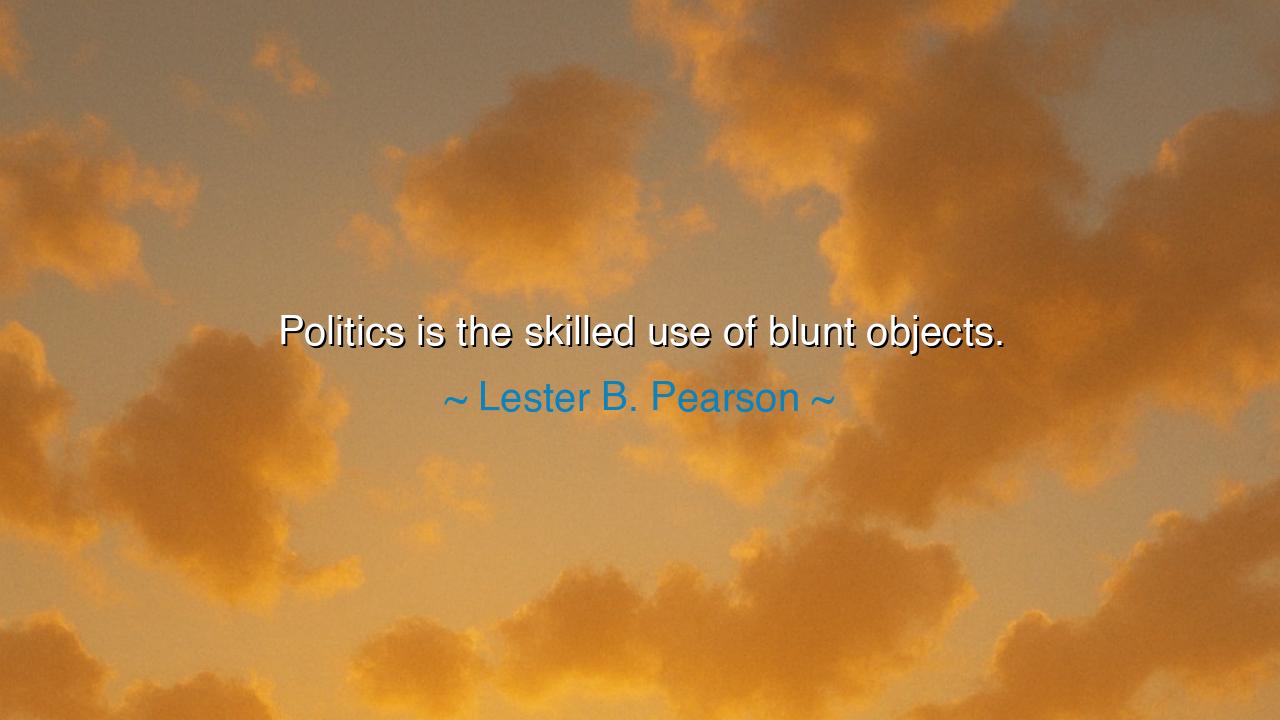
Politics is the skilled use of blunt objects.






Hear these words, passed down from Lester B. Pearson, a statesman whose wisdom was sharpened in the fires of war and diplomacy: “Politics is the skilled use of blunt objects.” At first, this utterance seems strange, even harsh, but within it lies a teaching of great depth. For politics is rarely a matter of delicate tools or perfect instruments. More often, it is the art of wielding coarse powers—laws, armies, public opinion, and compromise—things as heavy and unrefined as clubs. The mastery lies not in their sharpness, but in the skill with which they are guided.
To the unwise, the world of politics seems filled with bluntness, with crude measures that lack grace. Yet this is the way of human affairs. Nations are vast, peoples are many, and the instruments at hand are heavy. To govern is not to sculpt marble with a fine chisel, but to move boulders with levers, ropes, and bare strength. Pearson reminds us that the true measure of a leader is not whether the tools are blunt, but whether they are used with wisdom, restraint, and cunning. The great craft of politics is to turn coarse instruments toward noble ends.
Consider Pearson’s own life, for in him we see this teaching embodied. As a diplomat in the age of turmoil, he faced the Suez Crisis of 1956, when the world stood on the edge of war. The tools at his disposal were not subtle—they were the United Nations, a body cumbersome, divided, slow. Yet he wielded this blunt object with extraordinary skill, forging the world’s first peacekeeping force. With this act, he cooled the fires of conflict and offered humanity a new weapon of peace. For this, he received the Nobel Prize. His wisdom showed that even the coarsest instrument, placed in steady hands, could shield the world from ruin.
The ancients, too, knew this truth. Recall the Roman Senate, wielding decrees and legions, instruments as blunt as iron hammers. Rarely did their decisions please all, and often the tools were crude. Yet when guided by vision, Rome endured for centuries. But when blunt power was wielded without skill—when emperors struck wildly, caring only for their own survival—the empire cracked, and its weight crushed itself. Thus we learn: blunt objects without wisdom become instruments of ruin.
Pearson’s words are a reminder not to romanticize politics. It is not poetry, nor is it the realm of philosophers alone. It is the realm of action, where choices must be made with the tools available, not the tools imagined. To expect perfection is folly; to demand skill in the use of imperfection is wisdom. The leader who waits for the sharp sword of ideal circumstances will do nothing, but the leader who learns to wield the club of reality may yet carve pathways to peace.
What lesson, then, shall we take? That each of us, in our own lives, must learn to wield blunt instruments with care. You will not always have the perfect words, the ideal resources, the flawless conditions. But you will have something—a platform, a vote, a voice, a community, a chance. These may feel clumsy, even small. Yet if guided with discipline and vision, they can strike with great effect. Better a blunt tool in steady hands than a sharp blade in the grasp of the reckless.
So I say to you: do not despise the bluntness of the world. Do not wait for perfect tools. Instead, cultivate the skill to use what you have with wisdom. Speak when your voice trembles, act when your means are small, govern when the instruments are crude. For this is the way of politics, and indeed of life itself. Mastery lies not in the elegance of the weapon, but in the steadiness of the hand.
Thus Pearson’s teaching endures: politics is the skilled use of blunt objects. Learn to wield them well, and you may build peace out of chaos. Wield them poorly, and you will shatter what you sought to save. Choose, then, to become not merely strong, but skillful—for it is skill that turns bluntness into power, and power into justice.






MNMy Nguyen
Pearson’s perspective makes me think: if politics is about the skilled use of blunt instruments, does that mean compromise and nuance are seen as weaknesses? Is this why so much political discourse today feels like a series of battles rather than conversations? Can we ever move toward a more collaborative form of politics, or is this harsh, aggressive style simply the default in our polarized environment?
NVBach Nguyet Vy
This quote seems to capture the tough, often uncomfortable reality of politics. It raises an important question: is the ‘blunt object’ approach always the best option, or does it just reflect a lack of more sophisticated tools or strategies in politics? Do leaders resort to force because they lack the means for more strategic, compassionate solutions, or is it simply the nature of the game to rely on power plays?
PTThanh Hang Pham Thi
Pearson’s view is interesting because it makes me question the nature of political decisions. When politics is about using blunt objects, how much does it sacrifice subtlety or ethics? Can politics still be effective if it relies too much on forceful measures, or does that breed more division and conflict? How can politicians balance the need for tough action with the need for diplomacy and careful consideration of all sides?
THThuy Ha
Lester B. Pearson’s quote is a blunt but insightful take on politics. It makes me think: if politics is about the strategic use of ‘blunt objects,’ does that mean it’s more about power and force than collaboration and dialogue? How does this perspective shape our understanding of political negotiations? Is there room for nuance in politics, or does the need for quick, decisive action often overshadow more thoughtful approaches?